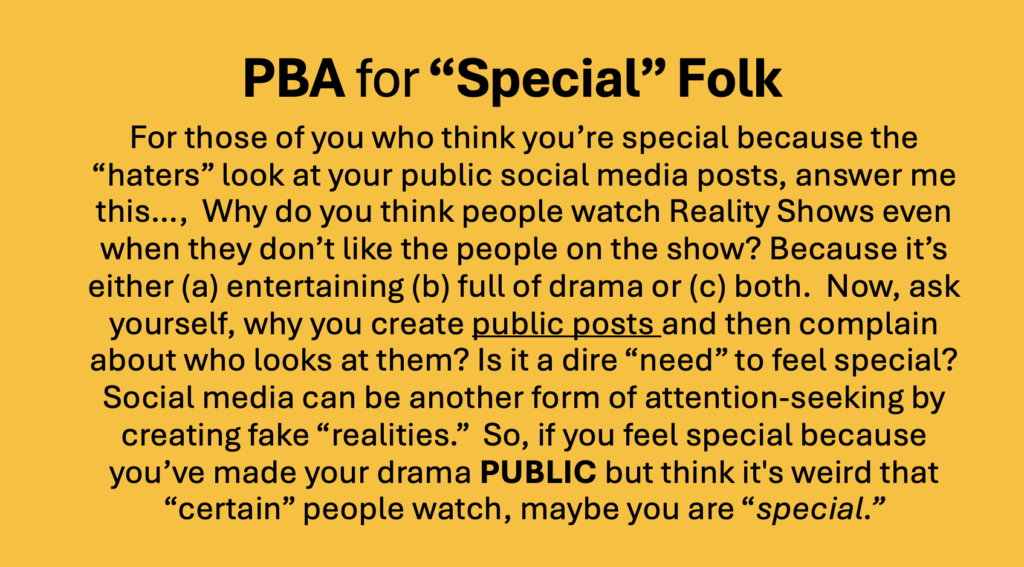
In today’s digital age, creating a public profile and sharing personal information online has become commonplace. Social media platforms offer a stage for individuals to showcase their lives, thoughts, and talents to the world. However, along with the benefits of connectivity and expression, there are pitfalls that come with choosing to make your profile and posts public.
First, it’s essential to recognize that by creating a public profile and sharing public posts, you are knowingly sharing information with a wide audience. This means that anyone, including strangers or acquaintances, can access your profile and see what you post. While this can be a powerful tool for self-expression, it also comes with the responsibility of acknowledging that whatever you post, it’s going to be made public. But somehow that logic is getting lost on certain individuals.
But What About the Haters?
No one should have access to your profile to whom you do not want to have access. It’s crucial to set boundaries and control who can view your posts and information. This helps maintain a sense of privacy and ensures that you are only sharing with those you trust. So, if you don’t want haters to see your profile, don’t make your profile public. Simple problem, simple solution, right?

One common issue of late is the tendency to claim to be a content creator or public figure with a public profile, only to then complain about people “stalking” your posts. It’s important to remember that when you make your life public, you are inviting attention and scrutiny, even from people you are worried about. So, if there are people you are worried about accessing the information you post, don’t make it public. Claiming to be a victim of stalking when sharing public information can be misleading and disingenuous.
Who’s Checking for You?
No, really…, who? Could it be that some individuals may actually seek to manipulate or control others’ perceptions of them by creating a false narrative where they can be the focus of attention? Enter stage left, the haters. You know, those folks in the general public who look at public profiles. If you are using social media as a platform to seek validation, attention, and approval due to underlying issues like low self-esteem, then yes, you most likely have haters. This is a complex phenomenon driven by various psychological factors but mainly attention-seeking behavior. Let me break it down for you…,

Knowingly posting personal drama on public profiles to attract attention because they are quite aware of the voyeuristic nature of social media, then complaining about the users who are drawn to sensational content that they created to get a temporary fix…, an influx of engagement and interaction with their page. The real issue at hand, is that this fulfills that individual’s need for attention. They become trapped in a cycle where they feel compelled to share increasingly dramatic stories to maintain the attention they crave, so that they can then claim people (or haters) are “watching” their page, all the while maintaining a public profile for the drama of it all.
The Social Media Effect
Drawing parallels to the Mandela Effect, a concept named after Nelson Mandela and identified by Fiona Broome, the relationship between Social Media attention-seeking behavior can contribute to the distortion of perceptions in the digital age. This shows how individuals can create a shared false memory phenomenon, with online interactions shaping people’s beliefs.
For instance, individuals may craft elaborate stories or share exaggerated personal experiences to garner attention, aiming to fulfill their craving for recognition or elicit sympathy from a love interest, within their peer group and even the online community as a whole. A social media influencer may exaggerate personal hardships to garner sympathy and engagement from their followers, ultimately perpetuating false narratives.

This not only reflects the complex interplay between one’s self-perception and online persona but also sheds light on the deeper emotional needs that underpin attention-seeking actions in the digital sphere. By creating and perpetuating a narrative where they are the focal point, they fill a void within themselves where they crave approval and affirmation from an individual or individuals. This is just a manifestation of the constant pursuit of external validation, which stems from a deep-seated desire to stand out or be the central figure to someone in the virtual spotlight because they are not in reality.
How to Create Drama on Social Media and Blame the Haters for Watching
It becomes evident when individuals intentionally fabricate stories or alter their online personas to attract more attention, they begin to live in the fake reality that they have created online in their heads. This constant quest for validation has distorted their perception of reality and blurs the lines between reality and fiction underscoring the powerful influence of social media in shaping our own and others’ perceptions.

The Social Media Effect refers to how people’s behavior on social media can distort their perceptions and beliefs. Similar to the Mandela Effect, where people collectively remember something incorrectly, social media can create a shared false reality.
This behavior reflects a complex interplay between how people see themselves and how they want others to perceive them online. By creating a narrative where they are the center of attention, and have haters, or stalkers on a public profile (make it make sense), individuals try to fill a void or seek approval from others. This behavior is often fueled by underlying issues like low self-esteem.
As people fabricate stories or alter their online personas for attention, they can start to believe in the false reality they’ve created. This blurring of reality and fiction is a result of the constant quest for validation that they are unable to provide themselves. It shows how powerful social media can be in shaping not just our own perceptions but also those of others.
To avoid falling into this trap, it’s important to be aware of why you’re sharing on social media and to whom, to avoid creating drama for attention. Being authentic and mindful of your motivations can help ensure that your online presence is positive and genuine. While creating a public profile and sharing public posts can be a powerful tool for self-expression, it’s essential to be mindful of the pitfalls that come with it. Checking yourself, instead of the “haters,” avoiding personal drama, and being aware of your motivations can help ensure that your online presence is positive and authentic.
Leave a Reply